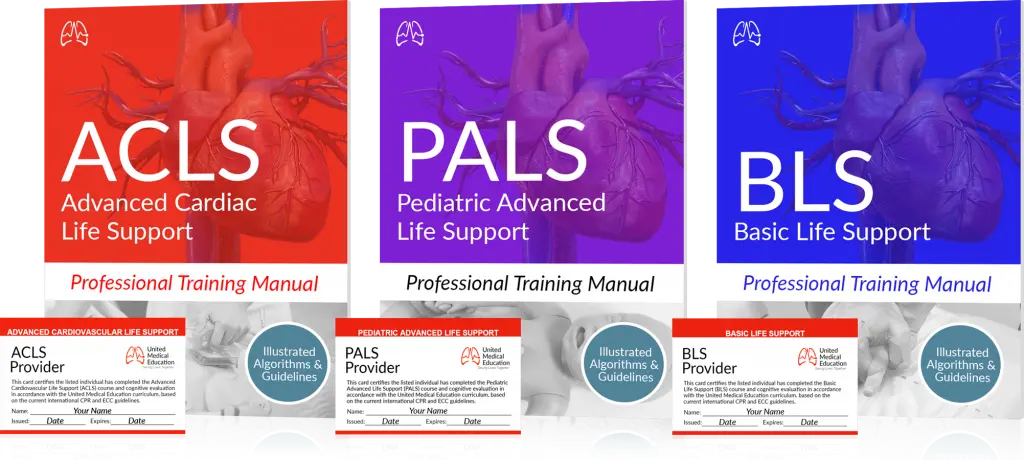Where to Start Looking
Cardiac arrest continues to be one of the main causes of death, claiming more than 475,000 lives a year. Over 350,000 of these cardiac arrests occur out of the hospital where prompt treatment by trained professionals is generally not an option. The number of deaths caused by cardiac arrest is more than auto accidents, firearms, breast cancer, prostate cancer, and colorectal cancer combined.
Fortunately, Employers and government officials are starting to realize the risk of cardiac arrest occurring during activities of daily living. As a result there are more regulations and employers requiring the training of their employees in cardiopulmonary resuscitation (CPR). Hospitals and other healthcare facilities are also requiring their employees to receive further comprehensive training such as Advanced Cardiac Life Support (ACLS) and Pediatric Advanced Life Support (PALS) for those who work regularly with children.
Many employees have turned to online certification for training because of the convenience it offers to their life and work schedules. While most facilities will accept online certification in ACLS, PALS, and BLS, some have set a requirement that their employees be certified through a live in-person course.
One of the largest barriers to the acceptance of online courses is due to management having a lack of knowledge in what is required by their state boards or credentialing bodies like the Joint Commission. Because of this, management often sets more stringent requirements on staff than necessary.
When choosing an ACLS certification course there are a couple things that every manager and student should keep in mind to know that it will be accepted by a hospital accrediting institution, so that the facility can continue to bill for medicaid and medicare. The primary of which the course should be accredited by a third party institution. Also, the course should follow the standards put forth by the International Liaison Committee on Resuscitation (ILCOR).
Because of the number of organizations and businesses offering ACLS, PALS, and BLS, managers and staff often become confused as to what is required. The most common misconception being that the course must be taken from the American Heart Association (AHA). However, the AHA is just another organization that has their courses accredited by third party institutions the same as the American Red Cross (ARC) or United Medical Education (UME). It’s important to learn what is ACLS certification.
Review of United Medical Education and Their Available Certifications
United Medical Education provides accredited life saving courses that follow the most current guidelines and standards as outlined by the ILCOR. Some of the certifications they offer are Basic Cardiac Life Support (BLS), which includes the fundamentals of CPR and how to manage a respiratory emergency. They also provide ACLS which includes the fundamentals of CPR and further advanced medical management training, such as drug delivery and heart rhythm recognition. Another certification they offer is PALS which includes the advanced management of cardiac arrhythmias and respiratory emergencies in younger patients.
Benefits of United Medical Education Courses
United Medical Education has the most flexible training and certification program. They have created an automated teaching, testing, and certificate delivery system that is regularly updated to help students efficiently prepare for life threatening cardiac and respiratory events. Free student accounts are offered with access to all the training materials and practice exams.
United Medical Education is particularly learning centered in that students can set the pace of their own training and can review different aspects of the program as many times as needed before certifying.
UME also offers both an instant digital provider card to students upon the completion of their course and a hard copy card that is shipped by USPS. This allows students who need proof of certification for their employer right away to still continue working as normal until the hard copy card arrives.
UME also offers an optional hands-on skills exam for students who work in a facility that requires a live skills test. While this is not required for students to receive their provider card it serves to add flexibility and meet requirements set by individual employers. The live hands-on skills test can be provided by another individual who has already certified in the given training giving flexibility to the student to find an instructor.
Potential Disadvantages
United Medical Education only has one potential drawback being that 1% of facilities may choose not to accept the certification. The organization has gained the trust of the general medical community internationally resulting in a 99% acceptance rate. This is why United Medical Education offers a 100% money back guarantee to students. While the majority of facilities do accept UME provider cards, some students may have a manager who only accepts a course based upon brand recognition.
While refunds are up to 100% of purchase price for unused courses, if the student used the course and received a hard copy card a small materials and processing fee is to be expected.
Review of the American Red Cross (ARC) and their Classes
The American Red Cross is a long standing organization that provides disaster relief, emergency assistance, and life saving education. While education is an important aspect of their provided services, it is not their singular focus like some other organizations and businesses. Their courses are designed for the general population, health advocates, and healthcare instructors.
Benefits of the ARC Courses
While most of their courses that are required by healthcare providers need to be purchased, the ARC does offer some free courses at the website redcross.org. Also, the ARC does offer some free reference materials before purchasing the paid courses. While many of their courses can be completed entirely online, some do require an in-person class.
There are 41 online courses offered by the ARC. These courses are self-paced, allowing students to take their time. These classes range in price from $0 to $120.
Potential Disadvantages of ARC Courses
Currently the ARC does not offer online ACLS, BLS, or PALS certification. Also, many of their online courses are not meant to meet professional requirements for most students. While the majority of their online classes provide valuable information to the layperson or healthcare instructor, they aren’t necessarily required for healthcare professionals to work in their respective professions.
They also don’t offer a 100% money back guarantee on all their courses. The amount refunded depends on if it was online or had a live portion. The amount refunded largely depends on the number of days left before the live scheduled event. If students cancel on the day of the event no refund is given. For online courses the ARC only gives students 24 hours to request a refund. After that no refunds are issued.
Review of the American Heart Association (AHA) and Their Courses
The AHA has had a long history in providing ACLS, PALS, and BLS. They also are one of the larger organizations within the United States that teaches emergency life saving courses. For this reason they have garnered widespread brand recognition for their education. The AHA courses follow the guidelines set forth by ILCOR and are accredited for continuing education credits like the courses of many of their competitors.
Benefits of American Heart Association (AHA) Courses
The AHA is one of the most well known brands that offers ACLS, BLS, and PALS certification. While they are an organization similar to UME and ARC, the AHA is often mistaken as an accrediting body. Even though this is not the case, it results in AHA courses generally being accepted by most employers nationwide.
The AHA has very comprehensive training materials that can be read online or found in paperback books. Their training materials also follow the guidelines of the ILCOR similar to those provided by UME.
The AHA recently started offering a portion of their ACLS, PALS courses online, although a live skills session is still required to earn a provider card.
Potential Disadvantages of AHA Courses
The AHA does not offer ACLS, BLS, and PALS entirely online. All three of these courses will require at least a live skills session with one of their certified instructors. This means that a class or test must be scheduled with a person in order to receive your provider card which may delay a student’s certification.
Their training books and ebooks are not free with the course and can come at an additional cost upwards to $42.
Which ACLS Certification Course Should You Choose?
Most students prefer a comprehensive online course that provides simple instructions and protocols. The manual skills actively involved in saving a life during a cardiopulmonary event generally come from real world experience under the direction of a more experienced provider, and not from a five minute interaction with a manikin. For this reason most organizations and businesses offering ACLS, BLS, and PALS certification have moved away from the live skills test requirement.
When choosing a course make sure to find an ACLS course provider that is accredited and offers continuing education hours. Course accreditation is the defining factor that will decide if the company offering the training is reputable.





